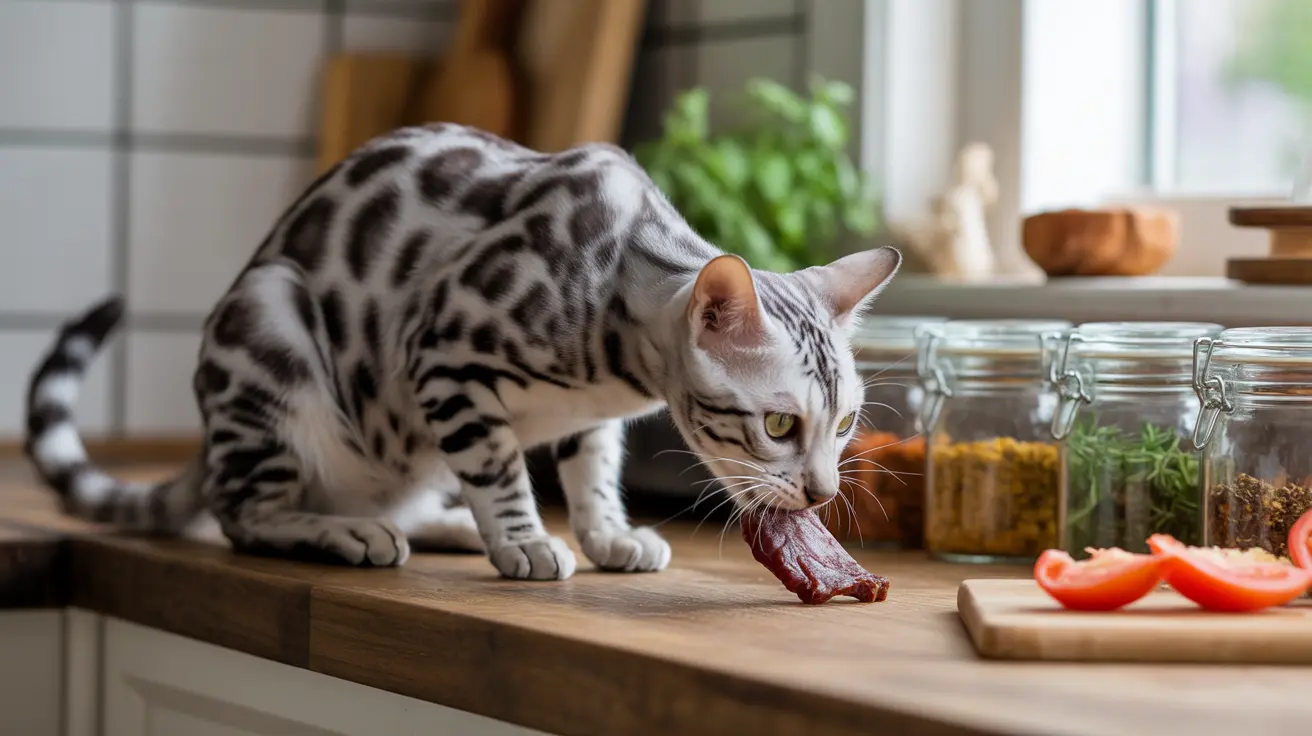If you've ever wondered whether sharing your beef jerky with your feline friend is safe, you're not alone. As cat owners, we often want to share our snacks with our pets, but when it comes to beef jerky, there are several important considerations to keep in mind.
While cats are natural carnivores and require meat protein in their diet, beef jerky designed for human consumption poses several significant health risks for our feline companions. Let's explore why this popular human snack might not be the best choice for your cat.
The Main Concerns with Feeding Cats Beef Jerky
Dangerous Ingredients and Additives
Commercial beef jerky contains several ingredients that can be harmful or even toxic to cats:
- Garlic and onion powder (commonly used seasonings that can cause anemia in cats)
- High sodium content (can lead to dehydration and kidney problems)
- Artificial preservatives
- Spices that may irritate your cat's digestive system
Health Risks from High Sodium Content
Most beef jerky contains excessive amounts of salt - often up to 22% of a human's daily recommended intake in just one ounce. For cats, who need significantly less sodium than humans, this can cause:
- Severe dehydration
- Electrolyte imbalances
- Kidney strain
- Potential sodium poisoning (hypernatremia)
Potential Hazards Beyond Ingredients
Physical Risks
The texture of beef jerky itself can pose serious risks to cats:
- Choking hazards due to its tough, dry nature
- Difficulty digesting the dense meat
- Potential for intestinal blockage if swallowed in large pieces
Allergic Reactions
Beef is actually one of the more common food allergens for cats. Signs of an allergic reaction can include:
- Skin irritation and itching
- Excessive grooming
- Gastrointestinal upset
- Hair loss in some cases
What to Do If Your Cat Eats Beef Jerky
If your cat manages to sneak a piece of beef jerky, don't panic. Monitor them for these symptoms:
- Excessive thirst
- Vomiting or diarrhea
- Lethargy
- Loss of appetite
Contact your veterinarian if you notice any concerning symptoms or if your cat has consumed a large amount.
Safe Alternatives to Beef Jerky for Cats
Instead of sharing human beef jerky, consider these safer alternatives:
- Commercial cat treats specifically formulated for felines
- Veterinarian-approved protein treats
- Small pieces of plain, cooked beef (occasional treats only)
- Cat-specific jerky treats made without harmful additives
Frequently Asked Questions
Can cats safely eat beef jerky made for humans?
No, cats should not eat beef jerky made for humans due to its high sodium content, potentially toxic seasonings, and difficult-to-digest texture.
What are the health risks of feeding beef jerky to my cat?
The main risks include sodium poisoning, dehydration, digestive issues, choking hazards, and possible allergic reactions. The seasonings used in beef jerky can also be toxic to cats.
What toxic ingredients in beef jerky should I avoid giving my cat?
Avoid beef jerky containing garlic powder, onion powder, excessive salt, artificial preservatives, and spicy seasonings, as these can all be harmful to cats.
Are there safer alternatives to beef jerky for cat treats?
Yes, there are many safe alternatives including specially formulated cat treats, commercial cat jerky treats, and plain cooked meat in small amounts as occasional treats.
What symptoms indicate my cat has had a bad reaction to eating beef jerky?
Watch for symptoms such as excessive thirst, vomiting, diarrhea, lethargy, weakness, or signs of allergic reactions like itching or skin inflammation.
Conclusion
While it might be tempting to share your beef jerky with your cat, it's best to avoid this practice altogether. The risks associated with the high sodium content, potentially toxic seasonings, and difficult texture make it an unsuitable snack for felines.
Instead, stick to treats specifically designed for cats, and always consult with your veterinarian about appropriate treat options for your feline friend. Your cat's health and safety should always come first when considering human food items as potential treats.






